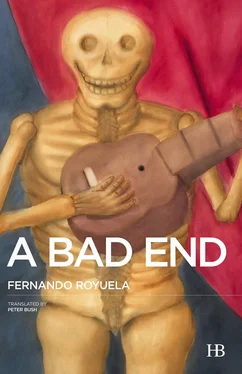Fernando Royuela - A Bad End
Здесь есть возможность читать онлайн «Fernando Royuela - A Bad End» весь текст электронной книги совершенно бесплатно (целиком полную версию без сокращений). В некоторых случаях можно слушать аудио, скачать через торрент в формате fb2 и присутствует краткое содержание. Год выпуска: 2016, Издательство: Hispabooks, Жанр: Современная проза, на английском языке. Описание произведения, (предисловие) а так же отзывы посетителей доступны на портале библиотеки ЛибКат.
- Название:A Bad End
- Автор:
- Издательство:Hispabooks
- Жанр:
- Год:2016
- ISBN:нет данных
- Рейтинг книги:3 / 5. Голосов: 1
-
Избранное:Добавить в избранное
- Отзывы:
-
Ваша оценка:
- 60
- 1
- 2
- 3
- 4
- 5
A Bad End: краткое содержание, описание и аннотация
Предлагаем к чтению аннотацию, описание, краткое содержание или предисловие (зависит от того, что написал сам автор книги «A Bad End»). Если вы не нашли необходимую информацию о книге — напишите в комментариях, мы постараемся отыскать её.
A Bad End — читать онлайн бесплатно полную книгу (весь текст) целиком
Ниже представлен текст книги, разбитый по страницам. Система сохранения места последней прочитанной страницы, позволяет с удобством читать онлайн бесплатно книгу «A Bad End», без необходимости каждый раз заново искать на чём Вы остановились. Поставьте закладку, и сможете в любой момент перейти на страницу, на которой закончили чтение.
Интервал:
Закладка:
Among the rabble of ex-jailbirds that came knocking on the door of the Trinitarians was a man with skin as crinkly as pork crackling and matte eyes that harbored a harsh, metallic glint. He answered to the name of Ceferino Cambrón and knew how to see off people’s stares. Everything about him was ashen gray — his hair, his hands, his words — and his was the icy demeanor of a statue erected to commemorate a thinker’s most solemn thoughts. One night when we were dipping our bread in a bowl of juicy tripe, Slim ordered me to collect the levy from him. I left my bread to soak and sat down on the bench where Ceferino was eating, his eyes glued on his food, prickly, saying next to nothing to the people around him, who were busy washing the tasty tripe down with a drop of strong wine. “If you want to stay here, you must pay him the levy stipulated,” I said, pointing a raised chin at Slim. He stabbed his fork into a piece of tripe that was dribbling orange goo and effortlessly lifted it to his lips. He chewed it unhurriedly, and when he’d finished, he deigned to reply. “And who might that be?” he asked disdainfully. “One-Eyed Slim,” I replied, “he’s the man who organizes this carry-on. If you don’t pay up, he’ll give you trouble.” Both their gazes met at that point and sniffed a challenge in the air: Cambrón’s was metallic, as if it were straight out of an iron foundry, and Slim’s was fleshier, hence softer, but nothing happened apart from that electric charge from their eyes as they met in the pestilent atmosphere of the dining room. Ceferino went on chewing, not saying a word, with me at his side waiting like an idiot for his response. “What a shit life,” the ex-jailbird exclaimed when he’d gobbled down what was on his plate. “Some seek a master they can serve without thinking, and others seek out freedom so they can think and not serve.” Those words made my brain ripple in sympathy; they made me see how the human species, although it’s a total lost cause, can entertain a thread of greatness that transcends mere daily survival — a hopeless longing to find a place where justice exists and is even practiced, a fallow desire to treat one’s peers according to the mottoes of equality and fraternity that, as if by some subtle magic, had been watered down into simple self-interest. I’d just discovered the lay Franciscan creed of Marxists, a beautiful, impossible creed that would soon change the direction of my existence yet again and drive it, as if there were room for anymore, into wastelands of demagogy, farce, and self-seeking.
Drifting leaves, tell me, what became / of the princes of Aragon, Manuel Granero, the pavane for a princess / if Madrid glows like a slide show / if it’s only in this district that seventy or seventy-five children jump, laugh, and scream as their mums show off Honolulu breasts, and girls walk by in fetching garb / micro-grooved skirts, shiny gloves, and glittering sandals, drifting, falling leaves / like Christ on the stony path, tell me, / who began this business of stopping, passing by, and dying, / who invented this game, this fearful solitaire / without a trick, that reduces you to cardboard, /if the Plaza de Oriente is a rose from Alexandria, / oh Madrid of Mesonero, Lope, Galdós, and Quevedo, / ineffable Madrid infested with diesel-oil, Yankees, and consumer society, / the city where Jorge Manrique would finally fuck up the lot of us. Blas was a man of reason, reason enlightened by darkness, the dense reason of a monk’s sweaty, smelly habit. Blas had a Franciscan je ne sais quoi that endorsed his tolerance, his convivial spirit, and his non-metric verse. He was like Cambrón in his resonating consciousness; perhaps both passionately embodied the anguish of life. You could see the leanness of their bones in their eyes; fasting was their source of knowledge. I, on the other hand, had always suffered from hunger. Hunger had always bit into my guts with an urgent twist, and now I have grasped it was all a lie, invented sensation, stylistic artifice. Pizzas keep the wolf from the door with their crispy dough and shower of ingredients. Providence graciously decided I should devote my time to their home delivery, and in so doing, I stumbled upon a fortune. My Europizza has become one of the most solid investments in the country’s entrepreneurial development. There’s no doubting that it’s an innovative line of business that has kept abreast of changes in habits, that gives me public recognition, not only in terms of sales numbers but also in the distinguished treatment I get from our institutions and the good vibrations I feel from so many contented customers. Five thousand direct jobs and another four thousand induced currently depend on the fact that I exist. Everybody orders them, everybody consumes them, but why? Mysteries are ineffable by their very nature, though one can’t fail to note that their flavors are distinctive and appeal to the most plebeian tastes and straight away suit the gastronomic stereotypes of your average diner. Garlic, olives, olive oil, and tomato constitute in themselves an undeniable category of preferences shared by the communal palate. Greater sophistication is unnecessary. Perhaps that’s the secret — simple food that comes to the table piping hot, a product suited to elemental IQs.
As well as being a construction worker on the dole, Ceferino Cambrón was also an elemental character. He never tried pizza; a bad end saw to him before the first of them hit the market. He did, however, possess dignity, the dignity of a scholastic creed one wears with a buttoned-up collar. He believed in social justice, in utopian socialism, in scientific communism, and in the poetry of Blas de Otero. Using the same criteria, he could have opted to believe in the resurrection of Christ, in the transfixion of the Virgin Mary, or in the poetry of Santa Teresa, but things are what they are and not perhaps as we would like them to be. I became increasingly intrigued by his standard patter; hearing him preach was pure bliss — what striking declarations, what clear concepts, what profound insights into people and their actions, all backed by analysis, reflection, and mature thought. He called a spade a spade, didn’t beat about the bush, took the bull by the horns, and merely craved the respect of others, and the hapless fellow didn’t even get that, so dismally was he damned. “Shut your trap, you shit-hole,” they’d say, more for the fun sound than any strict semantic meaning, and he, unaware of the scope of those brotherhoods of penury, carried on with his preaching, upright, unflinching, exalting the grandeur of justice, the wonderful meaning of solidarity, or the pressing, irrevocable need to overthrow the bourgeoisie as the oppressing class. Ceferino Cambrón’s frame had a haughty, Gothic aspect, which granted him a certain breadth from which to confront life emphatically from the flat peaks of his utopia. Besides, far from holding out his hand to beg for alms, though he didn’t intend to abandon the gift of the Trinitarian stew, he started to earn money in the metro by selling banned books and dirty mags from Finland, where big breasts vied ebulliently with buxom busts to fill pages to the full. Marx, Engels, and Blas de Otero comprised the essential texts in the trade he hawked across the entire map of the metro, from Portazgo to José Antonio, from Ventas to Cuatro Caminos, and when the aches and pains of exhaustion sank their fangs into his thighs, he’d go to the hallway of one of the busiest stations in the network, spread his merchandise neatly on spit-ridden tiles, and launch willy-nilly into his sales spiel, using shocking phrases he’d fished out of the texts he was selling, which he seasoned with his solemn, pompous diction: “A specter is haunting Europe: the specter of communism. All the forces of old Europe have entered into a holy alliance to exorcize that specter. .” At dawn on Sundays, he’d abandon the Trinitarian Mansion and go to the Rastro, where he continued to vaunt his products. He’d set up on a patch of pavement in the vicinity of Cascorrro and without more ado emulate Savonaralo in his denunciation of certain kinds of behavior and prophecies of catastrophe. People mostly bought his dirty mags, and as he bawled so much, they threw their coins at him. Slim ordered me to watch him from a distance and keep a close eye on the contacts who supplied the merchandise sustaining him in that poverty-stricken life, though it was hardly necessary, because I stuck to him like a limpet, and becoming aware I was stalking him, he transmuted my role, from spy to the meatier one of proselyte for his ideas, and he welcomed me into his shadow with a single proviso: that I should help him sell his goods. “Gregorio, you must recover the freedom to feel yourself a man and not allow anyone to appropriate your will. Use your handicap to bare the fangs of equality to the world and ensure at all costs that people don’t pity you because of your appearance. Respect is earned by stubborn persistence; dignity is born within the self. Reject favors from the powerful on principle, and never feel sorry for your own fate.” “Yes, Cambrón,” I replied, “but do tell me again about the dialectic of the class struggle and the final demolition of the bourgeois state,” and rather than injecting me with a dose of his doctrine, as I’d requested, he proudly began to recite the steely verse of Blas de Otero, as if wanting my consciousness to resonate with the artifice of his language. Like a proudly human angel, unleashed and pounding at the door, the verse flowed swiftly from his lips and hammered in my ear with inner, character-forging power.
Читать дальшеИнтервал:
Закладка:
Похожие книги на «A Bad End»
Представляем Вашему вниманию похожие книги на «A Bad End» списком для выбора. Мы отобрали схожую по названию и смыслу литературу в надежде предоставить читателям больше вариантов отыскать новые, интересные, ещё непрочитанные произведения.
Обсуждение, отзывы о книге «A Bad End» и просто собственные мнения читателей. Оставьте ваши комментарии, напишите, что Вы думаете о произведении, его смысле или главных героях. Укажите что конкретно понравилось, а что нет, и почему Вы так считаете.












